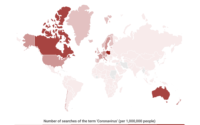The Middle East’s New Normal: Travel Returns And The Sky Is The Limit
The Global Business Travel Association’s BTI Outlook forecasts that global business travel spend will only recover to 2019 levels by 2025. Felled by the coronavirus pandemic, the post-COVID business travel slump is worse than any in recent memory. But the Middle East’s business travel will inevitably resume, and sustainability is already redefining how we’ll get around in the post-Coronavirus age.
One of the positive effects of the pandemic is the decrease in carbon emissions. This has made many consumers more conscious of climate change and environmental issues and has raised demands for businesses to rebuild with sustainability in mind. Lonely Planet and Culture Trip, two widely known travel guides, formed a strategic partnership to reimagine getaways that are more eco-friendly. Leaving behind ‘over tourism’ and cookie-cutter experiences, the goal of ‘Travel Reborn‘ is what the two brands are calling conscientious travel – taking the lull of lockdown to reset previously unsustainable experiences.
While the integration of technology is key when it comes to shifting consumer travel patterns, busines travel is different. Its impact on the planet has put sustainability at the top of the agenda for many corporate travel decision-makers because work trips are a key component of the economy. What the pandemic has shown us is that organizations of every size and kind can no longer afford to be negligent with the safety and security of their employees. It’s never been more important to reshape management travel and expenses, rethink corporate programmes and focus on making travel sustainable.
The business of travel
As business travel reopens, it’s also becoming imperative that organisations implement a travel risk management program, integrating technology tools like artificial intelligence (AI) and automation to help plan and managing upcoming trips with safety in mind. While business travellers can use mobile apps to access neighbourhood safety scores and assess whether the COVID-19 cases are high or low in the area, Gartner is looking at digital vaccine passports and standardised covid testing to reopen travel safely.
Despite the volatility of the travel sector and rules that change according to growing or declining infection rates, digital vaccine passports – which could easily be scanned alongside paperless airline tickets to access an online record of what a traveller has been inoculated against – could open-up the industry. The World Health Organization (WHO) has already launched a task team to develop a global standard for a digital vaccine certificate. In France, for example, all travellers must present a health pass that shows proof of full vaccination, a negative Covid test or proof of recovery from Covid within the previous six months.
ICT can have a significant impact on mitigating the risk of climate change. While technology has always been an important part of corporate travel programmes, from online booking systems to e-receipts and bots completing expense reports, innovation within this field will continue to grow and disrupt the sector. The good news is that organizations can use smart programm like SAP Concur to their advantage to gain full visibility into travel spend data, adhere to policy compliance, and create a must-needed sustainability framework.
While some organizations are willing to pay to go green, sustainability in travel is far more than reducing an organisation’s emissions when – there’s a direct intersection between economic and ecological sustainability: “The ramifications of COVID-19 will not be restricted to updated priorities in office routines and meeting preferences. There is a bigger cultural impact to come in the form of enhanced environmental consciousness and a sharper focus on carbon footprints,” says Mark Cullen, Managing Director for EMEA South at SAP Concur.
For any organization to successfully implement a policy to advance or achieve strategic carbon ambitions, it is commercially critical “that they think through the economics such that their partners, particularly on the travel side, are compensated to reflect those goals.”
Ultimately, corporate sustainability needs to become a win-win scenario – according to SAP’s Corporate Travel Sustainability Index 2020, nearly two thirds of corporate travel decision-makers said that sustainability is an integral part of their business travel policies. From the booking process to pre-trip approvals and completing expense reports, SAP Concur’s reporting capabilities makes managing C02 reductions simple by providing full visibility and an end-to-end picture of business travel.
As corporate travel returns across the Middle East, sustainability is the new reality. Creating a purpose fit program to ensure sustainable service delivery going forward is essential. Business travel is a key area of focus for SAP and TripIT, a travel organizing app from Concur, is just one example of how frequent travellers can gain a better understanding of their carbon footprint. Tying in with Expo 2020 and Dubai’s sustainability goals and efforts to reduce carbon emissions, SAP Concur is the ideal fit for any organization with climate change on the agenda.
The digitization of travel is the new normal. What are the post-pandemic trends and opportunities in your digital transformation journey towards becoming an Intelligent Enterprise?
Join SAP Concur Day on Thursday, 11 November and discover what it means to take a people-first approach to rethinking a spend management program. Don’t miss out – click here or visit https://go.concur.com/SAPConcurDay-MiddleEast-Virtual.html to find out more.








